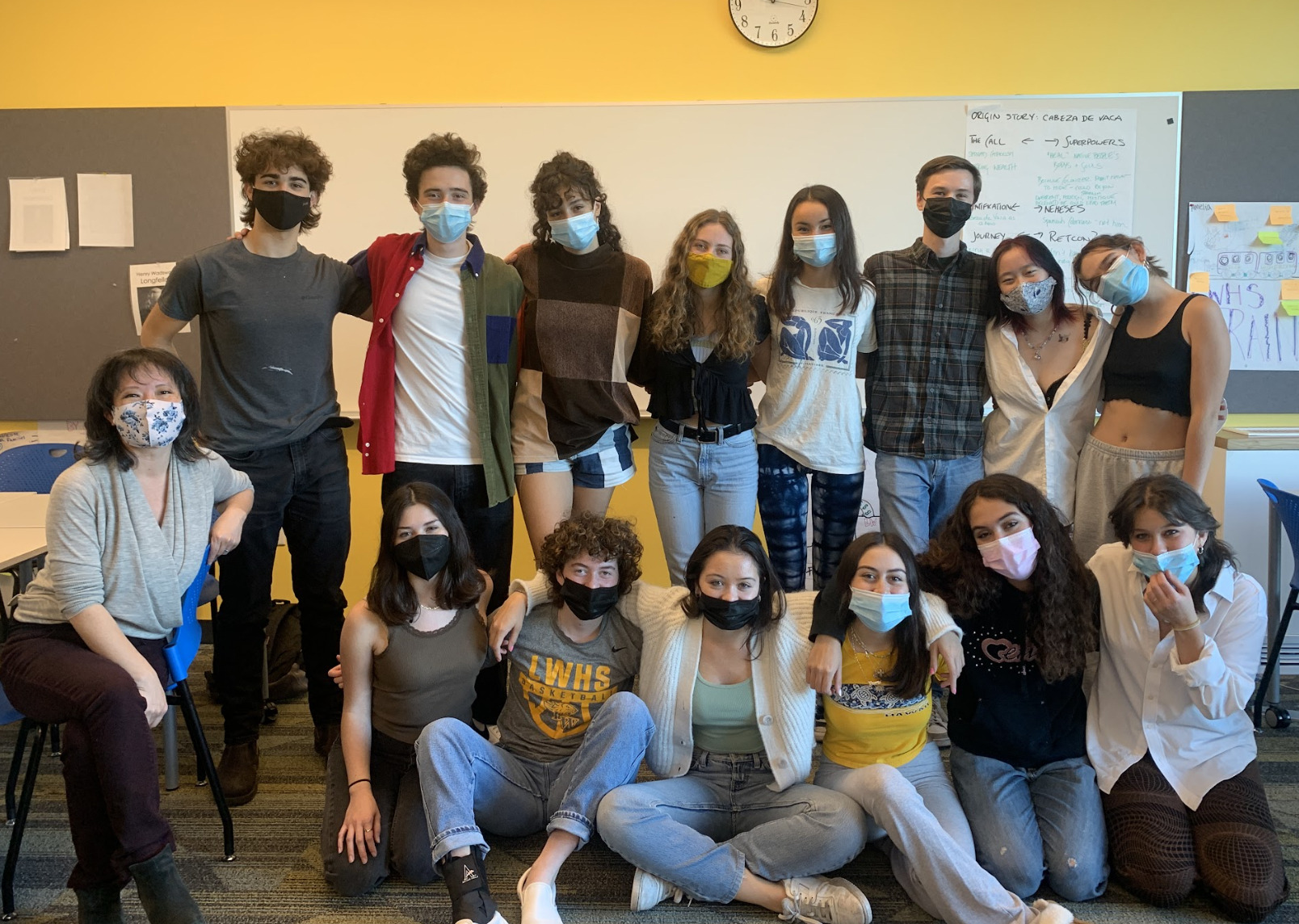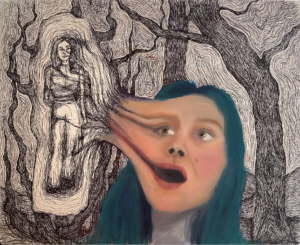The semester-long English 4 Honors seminar, Ethnic Studies, taught by Dr. Catherine Fung blends history, activism, traditional English discussions, writing and projects into an interdisciplinary study of race, ethnicity and histories often ignored by modern curriculums.
Fung has taught at Lick-Wilmerding for seven years. This is her fourth year teaching Ethnic Studies.
Fung was first introduced to ethnic studies while at UCLA. She said, “It was really eye-opening and empowering. I felt like finally my experience and perspective mattered.”
Fung taught at Bentley University on the East Coast prior to teaching at LWHS. There, she was never officially able to teach ethnic studies. She said, “There was still a lot of resistance and hesitation about embracing ethnic studies, so I always had to Trojan Horse it in.”
In 2016, when given the opportunity to propose an English class for LWHS 12th-graders, Fung focused on what she believed would speak to the student body at the time.
“That year there was a lot of energy on campus because it was the beginning of the Black Lives Matter movement,” Fung said. “I could tell the students were yearning to be activated. And so that signaled to me, what if this could be a part of the curriculum?”
She continued, “So much of ethnic studies is also about learning histories of resistance. I wanted to teach a class to give students some tools and vocabulary so that their energy can be directed towards something.”
Many LWHS classes already encompass many stories of resistance, but ethnic studies have not been explicitly incorporated. The English curriculum is representative of authors from all walks of life, with an emphasis on resistance.
The LWHS website says, “Courses that challenge the canon and center the narrative of BIPOC are at the heart of the English and History curriculums.”
History classes tend to focus on histories of resistance as well, but with less depth than a true ethnic studies class would have. Senior history seminars also include classes such as the Civil Rights Movement, The U.S. and the Middle East and Cultural Encounters and Anxieties in Modern Latin America. Fung will also be teaching an Asian American History seminar this spring.
Teaching ethnic studies at an elite private school in San Francisco might seem contradictory to the essence of ethnic studies. Fung said, “Arguably, a private school is antithetical to the ethnic studies movement. Private schools historically came from white supremacy and classism. So actually, I think it’s really interesting for private schools to engage and to see how far they can take it.”
For the current ethnic studies class, the summer reading included works by Mahatma Gandhi, Dr. Martin Luther King Jr. and Henry David Thoreau — each explaining various approaches to civil disobedience and nonviolent direct action.
The summer work also included accounts of the student-led activism at UC Berkeley and how in the 60s, ethnic studies came to be implemented in universities across the country.
These theories and histories set the groundwork for students to begin exploring their applications when the class began.
The first few class periods were spent introducing students to what exactly ethnic studies is, as many came in with minimal understanding. Franny Nakada ’22, a member of the Ethnic Studies class, said, “I really enjoyed the way we eased into it and got a really good base of what ethnic studies was before launching into big projects.”
Once the foundations had been set, through presentations and documentaries, students engaged with the history of the Chicano movement as well as the history of the Asian American movement.
Then, the class dove into examining ethnic studies through a lens of literature in a traditional English class style. Students read and discussed memoirs, poems and short stories by authors of color.
For the first large assessment, students began applying everything they had learned to their own lives by writing project proposal papers that took the form of letters, 10 point programs or a list of demands. Each paper discussed issues within the community. Examples included working towards the issues of the administration’s handling of sexual assault at LWHS, mental health at LWHS and the LWHS decision regarding the Heritage Speakers Class.
Students can gain PPP credit by turning their position paper ideas into action and detailing this work to Alan Wesson Suárez from the Center for Civic Engagement. This aspect is not required.
Luke Jasso ’22, a current Ethnic Studies student, said, “I think that it’s really exciting to have the opportunity to collaborate with our peers to enact change that we feel is important. I would hope that we are able to make some meaningful progress.”
Activism inspired by the class is dependent on student initiative. Fung emphasized that, “If it’s not something that you all feel compelled to do on your own, then there’s no point in doing it. It just becomes a vanity project for me. I’m going to give you some tools, and then you can decide how to use them towards something that you’re already invested in.”
Jasso reflected on these tools for activism: “What has been the most valuable for me, has been learning how to be an activist and taking a lot of these tools and actually using them in a setting that feels more familiar to us like our own school.”
Felix Fein ’22, Student Body Co-President and Ethnic Studies student, said, “Activism is such a central part of ethnic studies and I think that for students it’s just a little surprising being in an English 4 Honors. And maybe that’s a good thing.”
This past year, Fung has focused less on activism in order to center healing for her students following the pandemic. “I focused more on radical love. It’s more about really contemplating and sitting with ourselves where we are instead of let’s organize. I feel like as a community, we’re maybe not ready right now.”
For many students, the class became a really unique academic space. Nakada said, “Learning histories that are more personal to people creates an environment where people can get vulnerable and also an environment where deeper connections can be made in a safe way.”
For Fung, this was also what made the class special. “I feel like this class, more than any other class, really opens up those kinds of conversations. It’s always really fun and gratifying to have a real connection with the students that I don’t usually get.”
Fung’s favorite part about the class was getting to learn new things about her students. “When we’re responding to the text and students will share that, ‘this is something I experienced growing up,’ that’s always my favorite part of this process.”
Jasso said, “You feel like you’re a part of something really important when you’re in the class.”
“It’s very much a student driven, open ended class and so that’s definitely a shift. But once you get used to that, I think that that leaves a lot of room for students to explore what feels important to them,” said Jasso.
Currently, Nakada is in an ethnic studies working group that hopes to help implement four years of ethnic studies at LWHS.
The working group began at the end of 2019 following a letter from an anonymous group of students of color posted on Eric Temple’s door.
The working group spent 2020 researching ethnic studies programs and creating presentations for admin that detailed the benefits of ethnic studies for the greater community.
They created several proposals for how ethnic studies could fit into schedules as a four year requirement. Nakada said, “Ethnic studies will eventually have to be something mandatory because of how many incidents we’ve had in the past few years of harassment towards students of color.”
Currently, the working group is preparing to conduct focus groups of students and involving more of the community.
Fein said, “I think it’s interesting to do ethnic studies through literature, but also sometimes it feels constrained by the English 4 Honors format.”
The semester long format also seemed to have limitations. Jasso said, “This is really just a timing issue, but I would have liked to have read some of these books all the way through instead of just having read excerpts from various chapters.”
School wide initiatives, such as the implementation of ethnic studies, eventually make it to the The Diversity, Equity and Inclusion (DEI) Committee of the Board of Trustees. According to LWHS’ website, this committee “works to educate the Board of Trustees and to ensure that the Board and its committees adopt best practices around diversity, equity and inclusion.”
The LWHS Diversity, Equity & Inclusion Roundtable is a group made up of students, Parents Association (PA) members, board members, Temple, Naomi Fierro Peña and Dee Johnson. The roundtable “convenes to unpack institutional challenges requiring the collective power and coordinated efforts of the entire school community,” according to the LWHS website.
Fein, a member of the DEI Roundtable, said, “The ethnic studies working group is doing the real heavy lifting, but we need more collaboration across constituencies for a curriculum to finally become implemented.”
Fein was encouraged by the recent California legislation requiring ethnic studies as a high school graduation requirement. “It’s not even as if Lick is pushing the boundary on this one,” said Fein.
Fein said, “I hope the conversation grows to include more of the community. Right now, I know many people are very devoted to making ethnic studies a graduation requirement and are very knowledgeable about ethnic studies. But there’s also probably a majority of the community that has very little information on it.”
Fein emphasized the importance of getting everyone in the community onboard within these earlier stages. “As soon as it’s a forced thing, people will be opposed to it, so it’s much better if you bring up the conversation before it becomes a requirement.”
Fung hopes that in the future, there will not be a need to teach a specific ethnic studies class because it will become fully incorporated within the entire school curriculum. She said, “I think that the goal of any ethnic studies practitioner like myself is that I don’t ever have to do this, that this doesn’t have to be a special thing and becomes something that’s absorbed into the school in general. Everything is ethnic studies in some way.”
Nakada said, “I really stress the importance of ethnic studies because I feel like a lot of people who aren’t well versed in what it is think it’s unnecessary to have a whole curriculum about it. It’s important to know the histories and experiences that are often ignored in order to have a more well-rounded world view and to be a more empathetic person to people who might not come from your same walk of life.”







